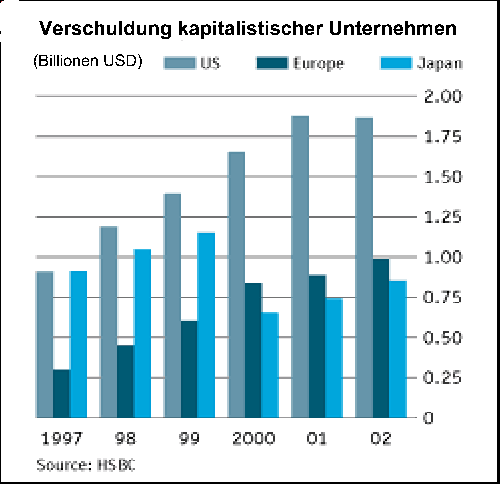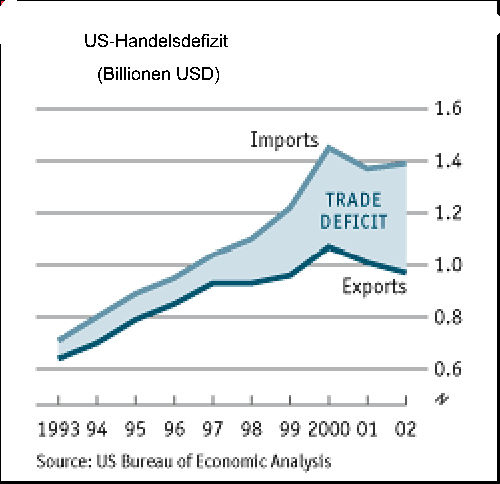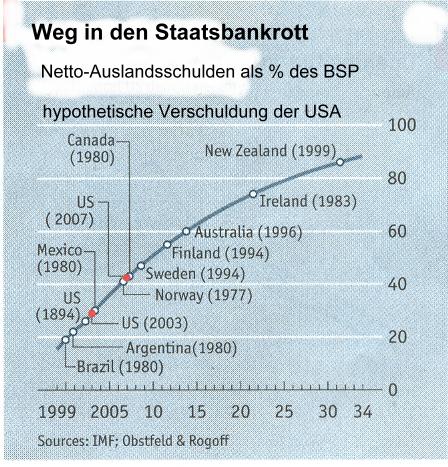|
Dollarcrash und Weltwirtschaft
In der Sonderbeilage "A survey of the world
economy" befasst sich die letzte Ausgabe des "Economist" (20.09.03)
weniger mit der Lage der Weltwirtschaft als mit der wachsenden
Schuldenlast der USA.
"American consumers' indebtedness is currently
growing twice as fast as their incomes. Increasingly, America's spending
has also been fuelled by the government." Die wohlhabenden und reichen
Amerikaner leben seit Jahren über ihre Verhältnisse, und die US-Regierung
verschuldet sich durch Rüstung und Kriegsabenteuer in aller Welt. "Defence spending
… is heading ever higher, according to estimates by Steven Kosiak at the
Centre for Strategic and Budgetary Assessments. He reckons that adding
together Mr Bush's grand plans for military modernization and existing
commitments in Iraq and Afghanistan, the defense budget over the next
decade will increase by nearly USD 700 billion more than assumed in Mr
Bush's budget projections."
"For years Americans
have been spending far beyond their means." Das gilt auch für die
US-Unternehmen.

"The United States, which as
recently as 1980 was the world's biggest creditor country, has now become
the world's biggest debtor country."
Jedes Individuum und jedes
Unternehmen und jedes Land betrachtet eine wachsende Verschuldung als
existentielle Gefahr.
"Just as an individual cannot pile on
credit-card debt forever, so a country cannot increase the burden of its
foreign debt indefinitely. Eventually, interest on the accumulated debt
would use all the economy's resources, leaving nothing for domestic
spending."
Von dieser einleuchtenden
Sicht will der Economist für die USA mindestens eine zeitweilige Ausnahme
machen. Er schreibt: "America is different". Der Economist sieht
die wachsende US-Verschuldung der letzten 20 Jahre nicht als Symptom eines
wirtschaftlichen Niedergang und eines zunehmenden Risikos für die gesamte
Weltwirtschaft, sondern als Wachstumsmotor für die anderen
kapitalistischen Länder:
"Global prosperity depends overwhelmingly
on American demand."
Das ist eine Behauptung, die nur Sinn machte, wenn es in der Welt sonst
keine Bedürfnisse mehr gäbe. Gibt es in der Welt keinen Hunger? Keinen
Wunsch nach Wohlstand und Entwicklung?
Auch der Economist weiß:
"America can no longer propel the global economy." "...the world
cannot continue indefinitely to rely an American spending." "...borrowing
from abroad at an accelerating rate can go on only for so long. Eventually
the interest an the debt will become too onerous. Long before then,
however, foreigners will become reluctant to provide the necessary
capital. Already the share of America's current-account deficit that is
funded by private foreign investors has fallen. It is Asia's central banks
– mainly Japan's and China's – that are picking up an ever bigger share of
the tap by buying huge quantities of American government
bonds."
"America's rate of borrowing is high and rising. At just over
5% of GDP, the current-account deficit ist the highest in the country's
history."
"In fact, America's current-account deficit is becoming
worryingly large. Several studies suggest that economies hit trouble when
their current-account deficit reach 4-5% of GDP."
Welchen
Ausweg haben die USA?
Der "klassische" Ausweg aus der Schuldenfalle
für kapitalistische Warenproduzenten lautet: Weniger einkaufen, dafür mehr
verkaufen, bzw. weniger importieren und mehr exportieren. Aber die
US-Industrie ist marode, die US-Autofirmen kämpfen seit Jahren mit der
Pleite. Die Stahlfirmen überleben nur mithilfe von Staatsbeihilfen.

Das US-Handelsdefizit ist Ausdruck einer strukturellen
Schwäche der US-Wirtschaft. Von der US-Industrie ist keine Trendumkehr,
keine Exportoffensive, zu erwarten.
Die USA haben allerdings einen
strategischen Vorteil gegenüber allen anderen kapitalistischen Ländern.
Sie können sich im Ausland mit der eigenen Währung verschulden. "It can
borrow in its own currency, which also happens to be the global reserve
currency. … Certainly these advantages allow America to borrow more than
others. … But they do not remove all limits."
Die Kredite und Gelder , die als
teure Dollars Jahr für Jahr und Tag für Tag in die USA flossen, sollen ab
sofort in billigen Dollars bedient werden. "With no alternative
engines ready to kick in, the dollar will have to play an even more
important role in America's adjustment than it did in the 1980s, when it
fell by 55% against the D-mark and 56% against the Yen. Since its peak in
2002, the dollar has already fallen by a total of 8% against its trading
partners. But that is nowhere near enough. Many economists reckon that …
it would need to fall by 40% or more to make a serious dent in America's
current-account deficit." Vereinfacht ausgedrückt: Falls der Wert
des Dollars um 50% sinkt, dann werden die USA für jeden Dollar, den sie
aus dem Ausland aufgenommen haben, mit entwerteten Dollars nur noch den
Gegenwert von 50 Cents zurückzahlen. Die amerikanische Verschuldungslast
wird so auf Kosten des ausländischen Kapitals um 50%
erleichtert.
"Unless other countries grow substantially
faster, relative to America, than they do now, the bulk of any adjustment
will depend on a depreciation of the dollar."
Dass das nicht ohne heftigen politischen
und wirtschaftlichen Krach in aller Welt abgehen wird, kann man leicht
vorhersagen.
"These are enormous shifts. If the burden were
spread equally across America's trading partners, a 50% drop in the dollar
would send the euro to well over 2 US-Dollar and the yen to less than 60
per dollar."
"If the current-account deficit remains at 5% of GDP, and
the economy grows by 5% in nominal terms (roughly its trend rate of real
growths plus inflation of just under 2%), America's debt stock will reach
40% of GDP by 2007 and 60% in a decade.

"Add all these factors together, and the trend in
America's indebtedness will become unsustainable, but not for al while
yet." Vielleicht
nicht sofort, aber spätestens in vier Jahren.
"Discussing the
coming fall in the Dollar, Mr. Rogoff recently commented:" The world is
set to jump off the top of a waterfall without knowing how deep the water
is below."
"The longer that America's current-account deficit – and
hence its reliance on foreign capital – continues to grow, the greater the
risk that a shock to America's financial markets will send the dollar
crashing. This would probably push the world economy into recession."
The Economist
schließt seinen Bericht: "If nothing changes, get ready for a
crash landing."
Wal Buchenberg,
22.9.04 |
